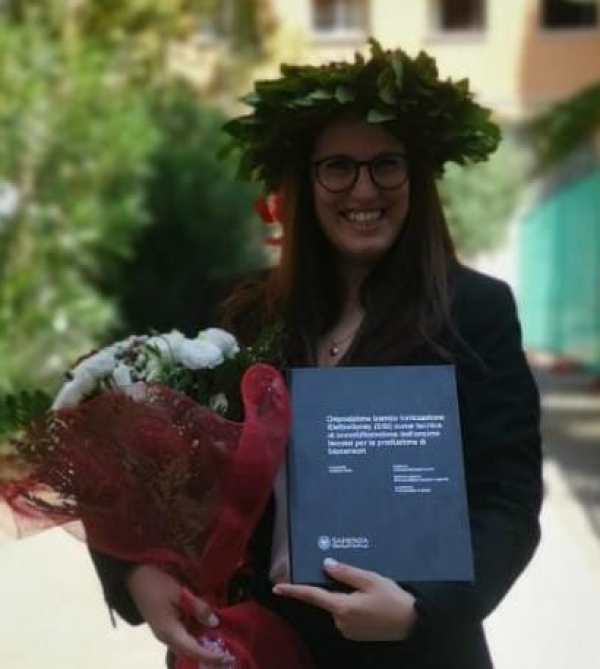A biosensor is a self-consistent device capable of transforming a biochemical mechanism into a measurable signal. It is made of i) a sensitive biological element, which selectively recognizes the analyte of interest, ii) a transduction element, which translates the occurrence interaction between the analyte and the sensitive element in a quantifiable signal, and finally iii)an electronic component that processes the signal allowing its acquisition. The enzymatic biosensor is a specific type of sensors in which the bioreceptor is an enzyme.
The enzymatic immobilization on the transducer surface, which guarantees the intimate contact between the bioreceptor and the transducer, is a key process in the development of efficient biosensors, with appropriate performances in terms of good operational and temporal stability, high sensitivity and selectivity, short times response and reproducibility. During the immobilization process, the enzymes must keep its original structural configuration, preserve its biological activity, and not undergo desorption during the use of the biosensor being strongly anchored to the transducer surface. The purpose of the thesis work was to test the effectiveness of ElectroSpray Deposition (ESD) as an enzymatic immobilization technique for the realization of an electrochemical laccase-based biosensor for the determination of catechol in the water. The absence of additional chemicals, using just a mixtures of water and methanol which can also be replaced by the less toxic ethanol, during the immobilization phase and the excellent performance in terms of reuse, stability over time and reconditioning of the biosensor, make both the process and the final product, more "eco-friendly".
Deposition by ElectroSpray has proved to be a simple but extremely effective, one-step immobilization technique, which allows to create a uniform sensitive layer avoiding any pre-treatmens of the electrode surfaces.
Friday, 30 July 2021 15:22
Degree in Industrial Chemistry with thesis at DepEST@CNR ISM
Ludovica Gullo graduated with 110/110 cum laude in #Industrial_Chemistry at # University_LaSapienza in Rome, with an experimental master's thesis carried out at the #DepEST laboratory of the #CNR-ISM in Montelibretti, #MDA - Molecular Dynamics and Application group. The thesis entitled, "Deposition by ElectroSpray Ionization (#ESI) as immobilization technique for the production of #laccase-based #biosensors”, has been overhauled by the Dr. Antonella Cartoni of Sapienza (internal supervisor), and the Dr. Mattea Carmen Castrovilli of CNR-ISM (external supervisor). We wish Ludovica the best of luck for her future!
Published in
Tutoring


 English (UK)
English (UK)  Italiano (Italia)
Italiano (Italia)